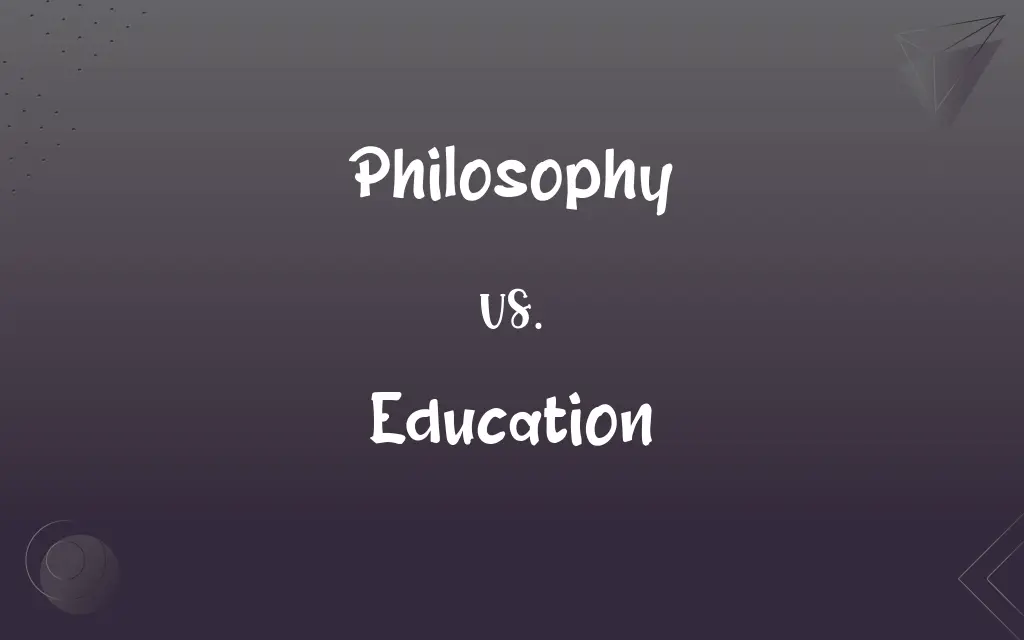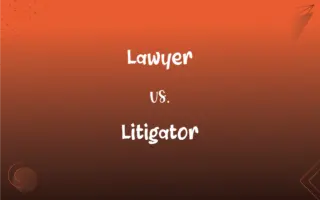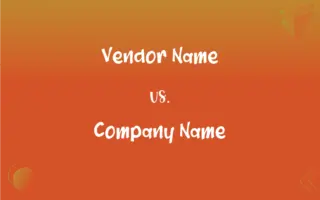Philosophy vs. Education: What's the Difference?
Edited by Aimie Carlson || By Janet White || Published on December 26, 2023
Philosophy is the study of fundamental nature of knowledge and existence, while education is the process of facilitating learning or acquiring knowledge.

Key Differences
Philosophy focuses on exploring fundamental questions about existence, knowledge, values, reason, mind, and language. Education, on the other hand, encompasses the teaching and learning specific skills and subjects.
The scope of philosophy extends to critical thinking and argumentation, delving into abstract concepts. Education involves a more structured approach to imparting knowledge, skills, and cultural norms.
Philosophy often challenges and examines existing beliefs and perceptions, while education is the means of disseminating knowledge and societal values across generations.
The practice of philosophy can influence educational methods and theories, but it remains a distinct, more contemplative and theoretical field. Conversely, education is a practical field focused on the application and dissemination of knowledge.
Philosophy seeks to understand the principles and truths underlying all knowledge. In contrast, education is the vehicle through which knowledge and skills are transferred and societal norms are established and maintained.
ADVERTISEMENT
Comparison Chart
Primary Focus
Exploring fundamental questions of existence and ethics.
Facilitating learning, teaching skills and knowledge.
Approach
Theoretical, abstract, and critical.
Practical, structured, and methodical.
Objective
Seeking understanding and intellectual exploration.
Imparting knowledge, skills, and cultural norms.
Nature
Often introspective and contemplative.
More outward-facing, focused on social and skill development.
End Goal
Gaining wisdom and understanding.
Achieving literacy, education, and professional competency.
ADVERTISEMENT
Philosophy and Education Definitions
Philosophy
A set of beliefs or principles that guide someone's actions.
Her philosophy on life is to be kind and honest.
Education
An enlightening experience.
His trip to Europe was an education in cultural diversity.
Philosophy
The theoretical basis of a particular branch of knowledge or experience.
His philosophy of science emphasizes empirical evidence.
Education
A body of knowledge acquired while being educated.
His broad education includes history, science, and literature.
Philosophy
The study of the fundamental nature of knowledge, reality, and existence.
His philosophy thesis explores the nature of consciousness.
Education
The theory and practice of teaching.
She is studying the education methods for special needs children.
Philosophy
A theory or attitude held by a person or organization.
The company's philosophy prioritizes customer satisfaction.
Education
The process of receiving or giving systematic instruction.
Her education in biology led her to a career in research.
Philosophy
A study that seeks to understand how to live well.
Ancient Greek philosophy focused on ethics and virtue.
Education
The field of study concerned with pedagogy and teaching.
She holds a degree in education and teaches high school.
Philosophy
The study of the nature, causes, or principles of reality, knowledge, or values, based on logical reasoning.
Education
The act or process of educating or being educated.
FAQs
Do all philosophers work in education?
No, not all philosophers are educators; many are researchers or writers.
Can philosophy change education methods?
Yes, philosophical ideas can lead to new educational approaches.
Is philosophy purely theoretical?
Mostly, but it can have practical applications, including in education.
Is philosophy important for educators?
Yes, understanding philosophy can enhance teaching methods.
Can education exist without philosophy?
Yes, education can function independently but is often enhanced by philosophical insights.
Can education shape one’s philosophy?
Yes, education can influence a person's philosophical views.
Is education a discipline within philosophy?
Education is a separate field, but it intersects with philosophy.
Is philosophy a part of education?
Yes, philosophy can influence and inform educational practices.
Is education always formal?
No, education can be formal or informal, structured or experiential.
Can educational theories be philosophical?
Yes, many educational theories have philosophical underpinnings.
Do all educators study philosophy?
Not all, but a background in philosophy can be beneficial.
Does education only occur in schools?
No, education happens in various settings, not just in schools.
Do philosophy courses include teaching methods?
Not usually; philosophy focuses more on theoretical concepts.
Are philosophers considered educators?
Some are, especially those who teach or write about philosophy.
Can education be self-directed?
Yes, self-directed learning is a key aspect of education.
Is the purpose of philosophy to educate?
Not solely, but education can be an outcome of philosophical inquiry.
Can education influence philosophical thought?
Yes, educational experiences can shape philosophical perspectives.
Is the goal of education to impart wisdom?
Partly, but it's also about skills, knowledge, and social development.
Is philosophy a necessary part of a good education?
While not necessary, it can deeply enrich an educational experience.
Can philosophy exist outside academic settings?
Yes, philosophy can be pursued independently of formal education.
About Author
Written by
Janet WhiteJanet White has been an esteemed writer and blogger for Difference Wiki. Holding a Master's degree in Science and Medical Journalism from the prestigious Boston University, she has consistently demonstrated her expertise and passion for her field. When she's not immersed in her work, Janet relishes her time exercising, delving into a good book, and cherishing moments with friends and family.
Edited by
Aimie CarlsonAimie Carlson, holding a master's degree in English literature, is a fervent English language enthusiast. She lends her writing talents to Difference Wiki, a prominent website that specializes in comparisons, offering readers insightful analyses that both captivate and inform.































































